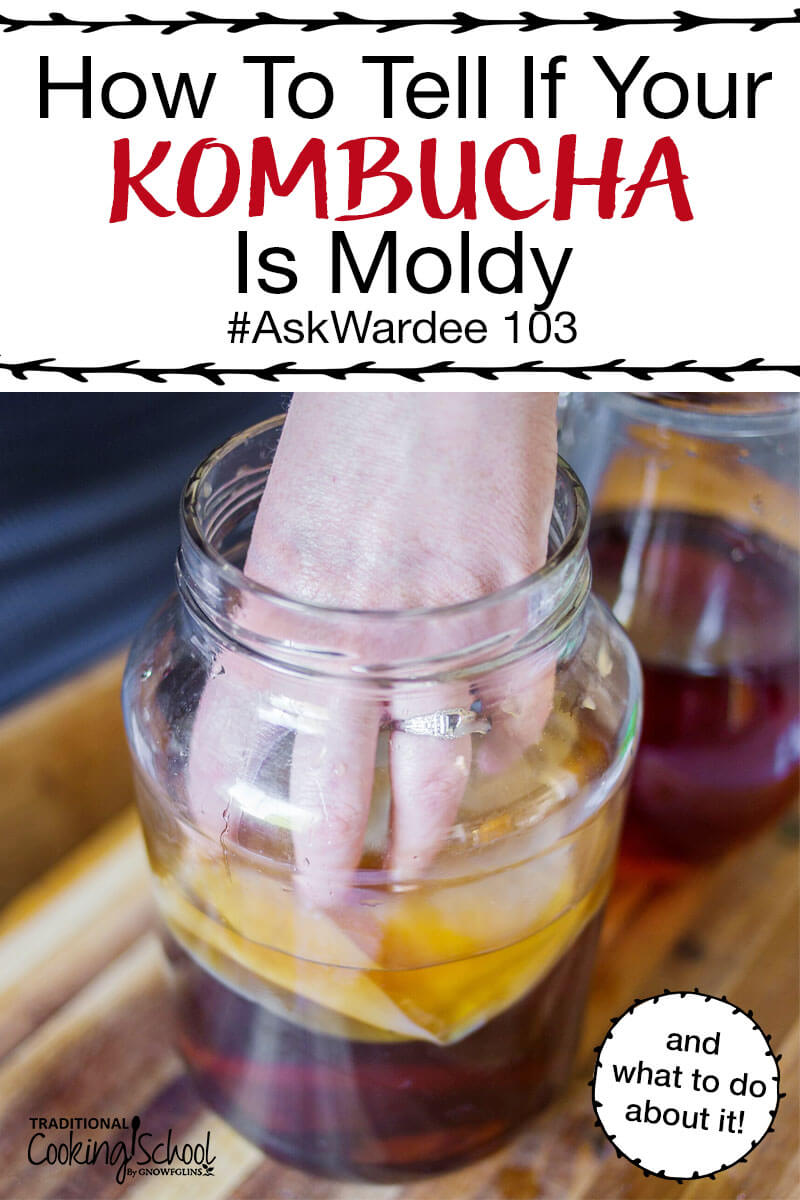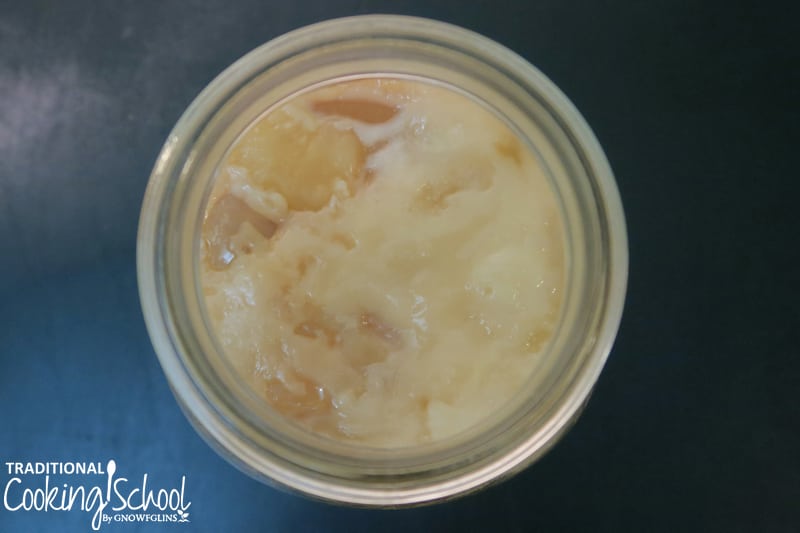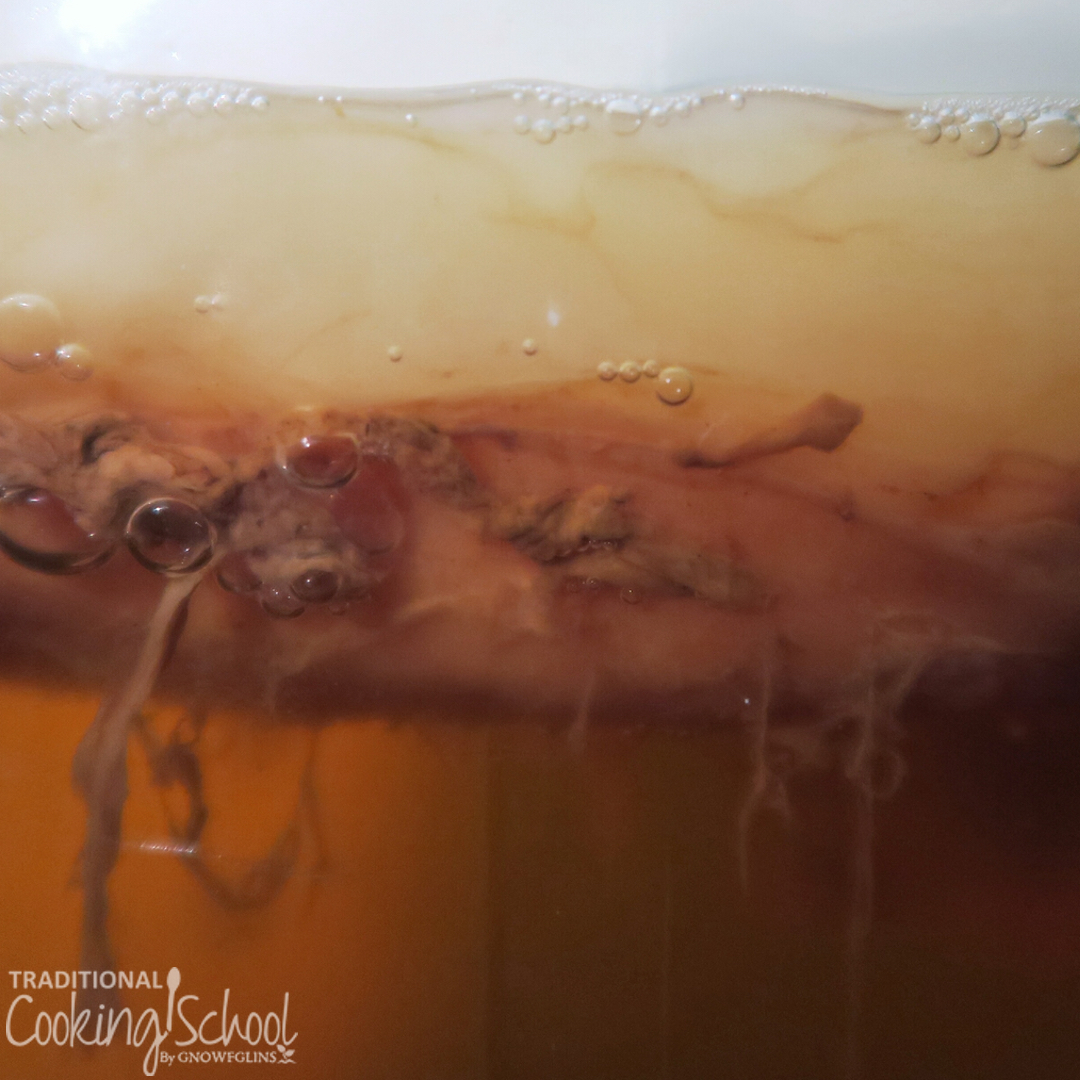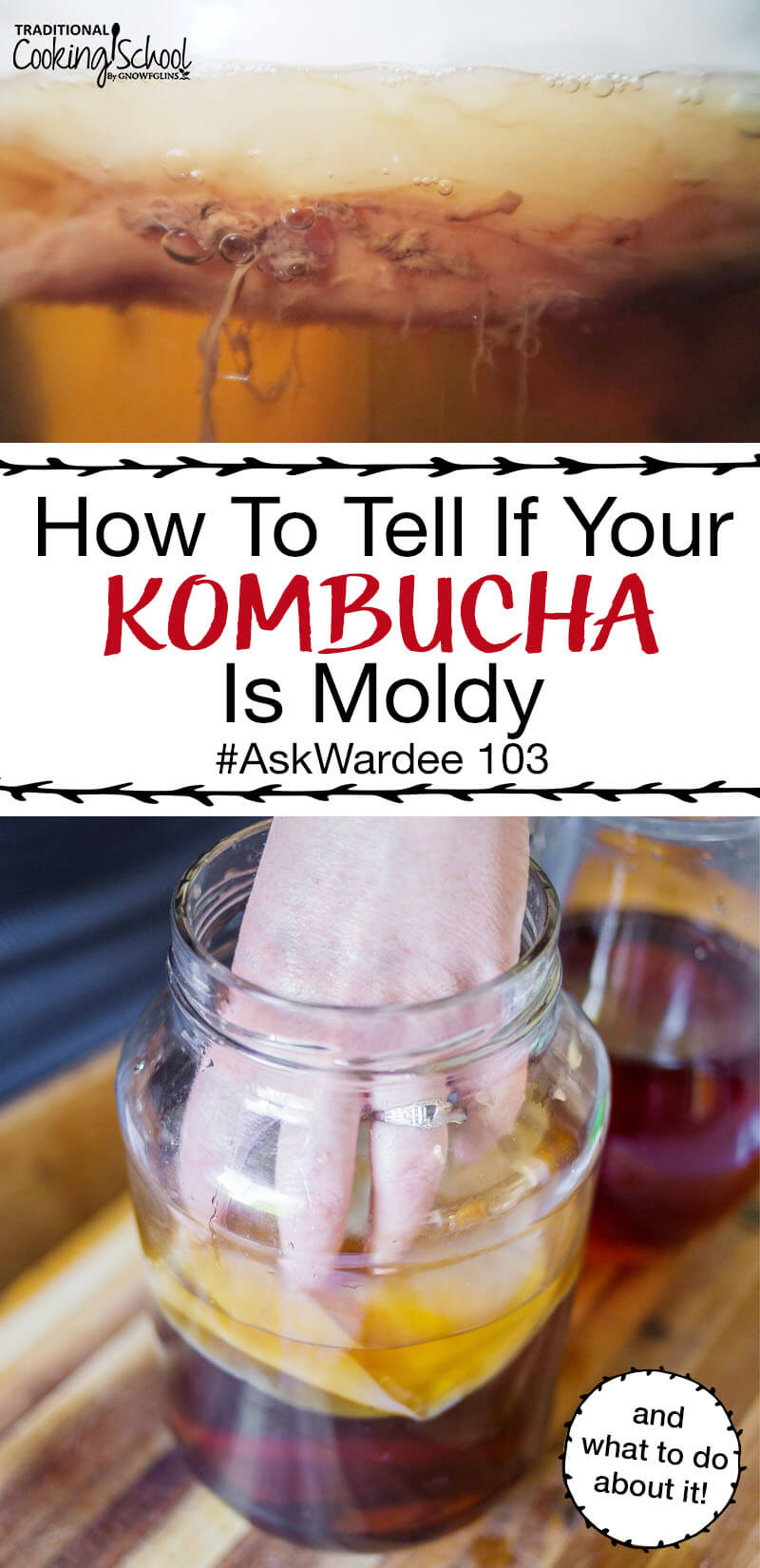
Oh, no… mold 🙁
Well, possibly not… because, actually, Kombucha rarely molds. The SCOBY — its mother culture — is quite hardy and balanced.
Yet, mold does happen now and then.
So, if you think it might be happening to you…
On today’s #AskWardee I’m teaching you how to tell if your Kombucha is moldy, and if it is… what to do about the current and future batches so it doesn’t happen again!
By the way… click here for my Ultimate Guide To Kombucha {how to make it, store it, flavor it, SCOBY care, troubleshooting, and MORE!}…
Read, listen, or watch below!
Subscribe to #AskWardee on iTunes, Stitcher, YouTube, or the Podcasts app.
Q: How Can I Tell For Sure If My Kombucha Is Moldy?
Jennifer P. asked:
I’m concerned that my Kombucha SCOBY might be moldy. How do I know for sure and what do I do if it is? Also, how can I prevent this in the future? Thanks so much!
Jennifer, I’m happy to help!

How To Tell If Your Kombucha Is Moldy
First, what’s Kombucha? It’s a delicious, fermented tea with benefits for digestion, the gut, and more. Here’s more about it plus my easy recipe!
If your Kombucha SCOBY (the mother culture) develops mold, it looks similar to mold you’ll find on old bread: fuzzy and green, grey, or blackish. The key word being fuzzy.
Smooth brown, black, or grey marks are not mold. Grey or black specks are not mold. Brown, smooth blobs, brown tendrils, sediment in the brewer — nope, not mold.
Sometimes people mistake the thin, translucent and possibly flecked new growth at the top of the SCOBY as mold, but it’s not mold either. That’s the SCOBY growing babies! 😉
Fuzzy green, grey, or blackish — that’s what Kombucha mold looks like.
So it’s pretty simple to tell if your Kombucha scoby is moldy. 🙂

What To Do If Your Kombucha Develops Mold
Did you know that Kombucha rarely, if ever, molds? We’ve been brewing it for many years and haven’t seen a speck of mold ever. It’s a super easy ferment to make in that regard.
In the unlikely (and sad) event that you do find mold, though, you shouldn’t try to salvage the SCOBY or the batch.
Toss it, clean all your containers, purchase or acquire a new SCOBY, and start a new batch of Kombucha.
It’s sad … yet necessary.
How To Prevent Moldy Kombucha
Although Kombucha very rarely molds, there are steps you can take to prevent it happening in the future.
- use very clean containers and utensils
- ferment it in a mold-free environment
- ferment it between 68 and 78 degrees Fahrenheit hot (too cold isn’t good for the culture, nor is too warm)
- keep it spaced away from other ferment (here’s why and how to do that)
- use the correct proportions of ingredients (here’s my Kombucha recipe)
- don’t let your SCOBY go dry (store it in a SCOBY Hotel when not in use… and don’t let that go dry either)
- always make sure your new batch contains 10% finished Kombucha or raw apple cider vinegar to ensure a successful brew.
Additional Fermenting Articles
- Troubleshooting Your Ferments (KYF172)
- 5 Tips: How To Prevent Mold During Fermentation #AskWardee 074
- Lacto-Fermentation 101 Video Series
- 7 Fermenting Mistakes You Might Be Making
- Which Water is Best for Fermenting?
- Which Kind of Salt Should I Use for Fermenting?
- Do Lacto Ferments Contain Alcohol?
- Can I Use Alternative Sweeteners in Ferments?
Helpful Links
- How Far Apart To Space Your Ferments #AskWardee 089
- Where To Buy A Live Kombucha Scoby
- My Kombucha Recipe
- SCOBY Hotel
- FREE eBook: The Ultimate Guide To Kombucha {how to make it, store it, flavor it, SCOBY care, troubleshooting, and MORE!}
- Free Fermenting Formulas Cheat Sheet
Has your Kombucha ever molded? What did you do about it?
We only recommend products and services we wholeheartedly endorse. This post may contain special links through which we earn a small commission if you make a purchase (though your price is the same).



What’s the health benefits between Kombucha and Kiefer is one better than the other? Do they have different health benefits?
Hi Sherryl,
Kombucha and kefir have wonderful probiotic health benefits with different strains of probiotics in them.
Here’s an article on about kefir: https://traditionalcookingschool.com/fermenting-and-culturing/whats-so-great-about-water-kefir/
Here’s a great article on kombucha: https://traditionalcookingschool.com/fermenting-and-culturing/whats-so-great-about-water-kefir/
~Danielle, TCS Customer Success Team
This is just a quick question, does anyone have a way to keep the tempurature just right? My 1929 farm house, even though we’ve replaced windows and doors, the kitchen is the coldest side of the house. That is why I did get green fuzzy mold on my SCOBY. It was sad to throw out. Summer is the only warm time and the busiest time when we want to be outside. I live in ND, so we get pretty cold here! Plus we’re in the middle of a kitchen remodel so very limited on counter space too. Any ideas would be great!
Hi Karin,
We would try a seedling warming mat underneath and wrap all the jar(s) with towels to keep them cozy. 🙂
http://amzn.to/2BTJGsx
~ Millie, TCS Customer Success Team
If the mother scoby is fine but the baby scoby at the top of the jar grows mold, do you need to throw everything out?
Hi Melissa,
I would throw it all away. I’m sorry.
~Danielle, TCS Customer Success Team
I have a 50 cent size green slime on top but not on my scoby. This with green tea and honey. What might this be.
Hi, Judy,
If it isn’t fuzzy I would take it off and keep going. If it is fuzzy it is mold. It could be completely normal if you could send a picture that would be great.
~Peggy, TCS Customer Success Team
What’s the health benefits between Kombucha and Kefir is one better than the other?
Hi there.
We don’t feel one is better than the other. Though kefir has less sugar, although it’s dairy and Kombucha is not. It’s helpful to consume different strains of beneficial organisms which is why people often eat both.
This article that discusses the different bacteria and yeast https://traditionalcookingschool.com/fermenting-and-culturing/56-fermented-probiotic-drinks-beyond-kombucha-kefir/
~Danielle, TCS Customer Success Team
I’m not sure whether this comment section is still active here, but figured it was worth a shot anyway…
I’ve been using the continuous brew method successfully for four 1/2 months (5 gallon oak barrel). I’ve been testing the pH and monitoring the brew daily. Last night, however, I unknowingly added moldy top-off tea/sweet tea solution to my continuous brew. It was NOT more than 1/5 the amount of the total kombucha in the brewer, and I don’t know how much mold was actually in the solution (as I did not notice until the next morning when the lighting conditions were better). I can’t see any mold in the brewer thus far, so I don’t want to jump to conclusions, but have decided to not drain off any kombucha for the next week, so I can monitor the brew the pH safely lowers itself.
Any thoughts or further suggestions? Do you think my culture will survive?
Thanks in advance,
Chelsea
Hi, Chelsea.
We’re not sure if it will survive or not. I’m sorry.
~Danielle, TCS Customer Success Team
I have had a Scobie hotel for over a year and just noticed some small beige bumps on the top layer of the Scobie. I’d like to send you a picture to ask if you have seen it before? I’m worried it might be mild but after listening to your video I don’t think it’s mold.
Hi, Marc,
Here are article/articles that might help you out:
https://traditionalcookingschool.com/food-preparation/ultimate-kombucha-guide/?swcfpc=1
https://traditionalcookingschool.com/food-preparation/recipes/how-to-create-a-scoby-hotel/?swcfpc=1
Also, in case you didn’t know, we have a Bible-based cooking program where Wardee and our teachers and moderators answer questions about Traditional Cooking (such as sourdough and fermenting or kombucha) via a private support group.
I’m sorry but we’re unable to answer support questions outside of our program. Would you like more info about our program?
Here is a link for more info:https://lp.traditionalcookingschool.com/lp/member/
I’m happy to answer questions about the program so you can get plugged in and get the help you need!
~Peggy, TCS Customer Success Team